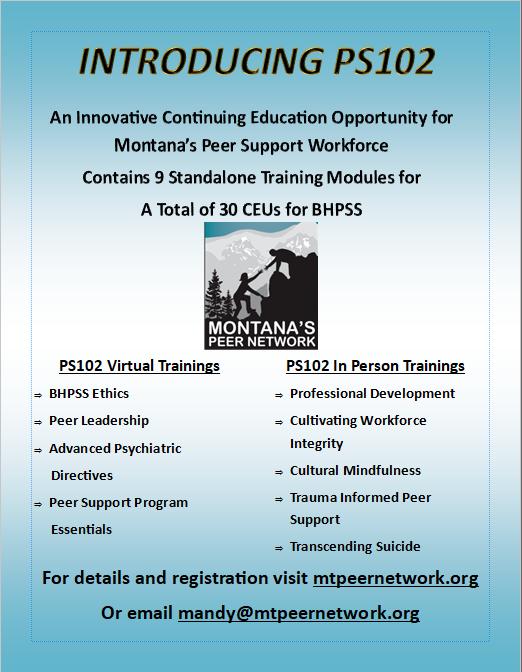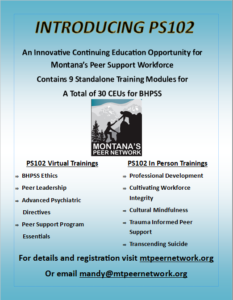
by Mandy Waite, Assistant Director
November 7, 2023
Peer Support Specialists play a crucial role in the behavioral health field, offering empathetic understanding and lived experience to those in need. While their dedication is commendable, it's essential to recognize the immense value that career development can bring to their professional journey. Montana’s Peer Network continues to create opportunities for career development because we recognize the significance of investing in the growth and advancement of Peer Support Specialists, and how it not only benefits them personally but also contributes to the overall improvement of behavioral health services.
 Empowerment and Self-Actualization
Empowerment and Self-Actualization
- Enhancing Skill Set: Career development opportunities provide Peer Support Specialists with a platform to acquire new skills, further honing their abilities to connect with and support individuals on their recovery journeys.
- Boosting Confidence: Gaining additional knowledge and skills instills confidence, enabling Peer Support Specialists to approach their roles with increased assurance and effectiveness.
- Professional Identity: Ongoing career development helps Peer Support Specialists solidify their professional identity, recognizing the unique contributions they bring to the recovery and behavioral health landscapes.
Improved Client Care
- Expanded Toolset: Through continuous learning and development, Peer Support Specialists are equipped with a broader range of strategies and interventions to offer tailored support to their peers.
- Cultivating Cultural Humility: Professional growth opportunities facilitate a deeper understanding of cultural nuances and diverse perspectives, enabling Peer Support Specialists to better connect with individuals from varied backgrounds.
- Staying Informed about Best Practices: Keeping abreast of the latest research and industry trends ensures that Peer Support Specialists are well-informed and able to implement evidence-based practices in their work.
Career Advancement and Opportunities
- Vertical Growth: With access to career development resources, Peer Support Specialists can pursue higher-level positions, such as supervisory or managerial roles, allowing them to influence organizational strategies and policies.
- Diversification of Roles: Through training and education, Peer Support Specialists can diversify their skill set, opening doors to new roles within the field, such as advocacy, education, or program development.
- Increased Earning Potential: Professional development often correlates with increased earning potential, recognizing the value and expertise that Peer Support Specialists bring to their organizations.
Contribution to Organizational Success
- Elevated Quality of Service: Well-trained and continuously developed Peer Support Specialists contribute to the overall quality of behavioral health services provided, enhancing the reputation and impact of their organizations.
- Innovative Problem-Solving: Continued learning fosters a culture of innovation, enabling Peer Support Specialists to devise creative solutions to complex challenges within the behavioral health landscape.
- Retention and Employee Satisfaction: Offering career development opportunities demonstrates an organizational commitment to the growth and well-being of Peer Support Specialists, leading to higher job satisfaction and retention rates.
Career Development Opportunities for Peer Support Specialists:
- Certification and Training Programs:
- Peer Support Specialists can participate in specialized programs that provide advanced training in areas such as suicide intervention (ASSIST), crisis intervention (CIT), or recovery planning (WRAP).
- Continuing Education Courses:
- Access to workshops, seminars, and training courses covering a range of topics relevant to recovery, behavioral health, and peer support. Montana’s Peer Network offers our PS102 Training modules for free, consisting of 9 standalone trainings, some in person and some virtual, including Trauma Informed Peer Support, Cultural Mindfulness, BHPSS Ethics, and Transcending Suicide.
- Supervision and Mentorship Programs:
- Pairing experienced Peer Support Specialists with newcomers in a mentorship or supervisory capacity allows for knowledge transfer, skill development, and guidance in navigating complex cases. Montana’s Peer Network has had a mentorship program for the last 3 years that has been focused on mentoring Peer Support Specialists throughout the state, as we move into this next year, we will also be focusing on mentoring organizations to help them create a culture that Peer Supporters will thrive in.
- Conferences and Workshops:
- Attending industry conferences and workshops provides opportunities to network with peers, learn about cutting-edge practices, and gain exposure to new research and interventions in the field. Montana’s Peer Network hosts our annual Recovery Conference in September and members get in free. We have multiple workshops, great networking opportunities, and we have a great time celebrating recovery. We may have something new in the works for this spring, so stay tuned for that.
- Leadership and Management Training:
- Programs that focus on leadership, management, and organizational development can prepare Peer Support Specialists for supervisory or managerial roles within their organizations. Montana’s Peer Network offers Peer Support Program Essentials and Provider / Employer training. Though they aren’t designed as management training per se, the trainings provide vital information on the foundational elements of successful Peer Support Programs.
- Advanced Specializations:
- Opportunities to specialize in areas like Family Peer Support, Youth Peer Support, or Forensic Peer Support allow Peer Support Specialists to serve specific populations with greater expertise. Though we don’t have specialty certifications at this time, Montana’s Peer Network is on the front lines advocating and building new trainings.
- Advocacy and Policy Engagement:
- Training and support for Peer Support Specialists interested in advocating for policy changes or participating in behavioral health advocacy efforts at local, regional, or national levels. Montana’s Peer Network is an advocacy organization, and we continue to support others that seek advocacy opportunities.
- Publication Opportunities:
- Involvement in writing articles, blogs, or being on podcasts related to recovery, behavioral health, and peer support can provide a platform for professional growth and recognition. Montana’s Peer Network publishes weekly blogs, and our Recovery Talks podcast is available on many platforms including SoundCloud, iTunes, Spotify, and now YouTube. If you’re interested in writing an article or being a guest on our podcast, please reach out!
- Networking and Professional Associations:
- Joining professional organizations and attending networking events can facilitate connections with colleagues, potential mentors, and leaders in the behavioral health and recovery communities. Montana’s Peer Network is currently collecting data on what Peer Supporters want in a state Peer Support Association. Missoula has done amazing at setting up networking events, through collaboration between United Way, SUD Connect, and community Peer Supporters, they host a luncheon every other month specifically for Peer Supporters to network and support each other. We would love to see similar events set up in communities across the state. Please reach out if you are interested in starting something like this in your community and we can get you in touch with those in Missoula that got this started.
- Self-Care and Wellness Practices:
- Training on self-care techniques and wellness practices is essential for Peer Support Specialists to maintain their own recovery and well-being, allowing them to continue providing effective support to others. Montana’s Peer Network understands the value of self-care and we specifically promote it in all of our trainings.
- Online Communities and Forums:
- Engaging in online forums and communities focused on recovery, behavioral health, and peer support can provide a platform for learning, sharing experiences, and accessing resources from a global community of peers. Throughout the years, Montana’s Peer Network has hosted many virtual networking events in an effort to create community across our large state. There are also a variety of other online community forums for peer support specialists.
These career development opportunities serve as a comprehensive guide to help Peer Support Specialists advance their skills, knowledge, and impact within the recovery community and behavioral health field. As you can see, Montana’s Peer Network is dedicated to creating opportunities for career development because we recognize the significance of investing in the growth and advancement of Peer Support Specialists.

